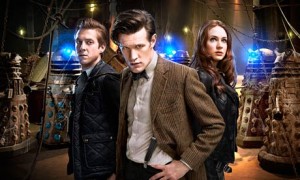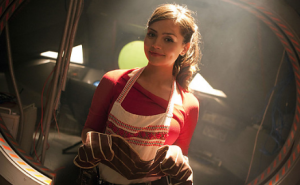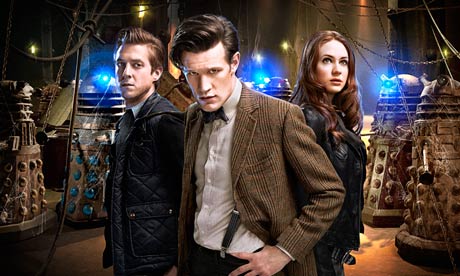The Series Seven premiere proves to be a quest story in more ways than one.
(As ever, “TARDIS Talk” treats everything officially aired through the most recent episode as fair game, so here there be spoilers!)
Off and Running!
 Last year, I had to watch “The Impossible Astronaut” (6.1) three times before I could decide whether I liked it. Not so this year. Series Seven’s opening salvo won me over the first time through. Granted, the idea that the force field surrounding the Daleks’ planet for the incurably insane can only be shut down from within is, to put it charitably, counter-intuitive. Everything else about “Asylum of the Daleks,” however, works, and wonderfully so—from the creepy concept of Daleks’ human “puppets,” to the shifting of the self-destructing Dalek into “reverse,” to the necessity of an “intensive care unit” for Daleks who’d survived (but only just) previous encounters with the Doctor, their “predator.” Even the quintessential Who cliché of running through corridors felt like a romp rather than a retread!
Last year, I had to watch “The Impossible Astronaut” (6.1) three times before I could decide whether I liked it. Not so this year. Series Seven’s opening salvo won me over the first time through. Granted, the idea that the force field surrounding the Daleks’ planet for the incurably insane can only be shut down from within is, to put it charitably, counter-intuitive. Everything else about “Asylum of the Daleks,” however, works, and wonderfully so—from the creepy concept of Daleks’ human “puppets,” to the shifting of the self-destructing Dalek into “reverse,” to the necessity of an “intensive care unit” for Daleks who’d survived (but only just) previous encounters with the Doctor, their “predator.” Even the quintessential Who cliché of running through corridors felt like a romp rather than a retread!
“The Eleventh Hour” (5.1) will likely forever be the gold standard against which I judge Doctor Who season openers, but “Asylum of the Daleks” benefits immensely from having to introduce neither new ongoing characters nor continuing story arcs (unless, of course, it did the latter—more on that in a moment). The episode does, of course, build not only on what Moffat has already accomplished in his two years as Who’s head writer—the news, just a few minutes in, that Amy and Rory’s marriage is on the rocks comes as a real blow to those who’ve been faithfully following them; and so the Doctor’s masterful manipulation of their reconciliation comes as an equally real relief—but also on arguably the show’s most iconic lode of lore beyond the Doctor and the TARDIS: the Doctor’s longest-running nemeses, the Daleks. But the story still feels new (as the Doctor himself observes in a nice meta-moment as the members of the Daleks’ Parliament shrilly cry out for salvation). No great knowledge of Who trivia is needed to understand and enjoy this story. The Doctor and his Companions are “acquired” from their current circumstances and are plunged (maybe that’s why the Daleks come equipped with those things!) into a suspenseful, fast-paced, and, ultimately, poignant quest.
Who’s Who
 The show really shines, however, in Moffat’s gift of yet another brilliant “one-off” character in Oswin Oswald. Or is she never to return? I’m doing my best to avoid spoilers this year (River Song would be so proud), so I don’t know what, if anything, to make of the fact that Oswin was played by (to my mind, a very Summer Glau-esque) Jenna-Louise Coleman. She, of course, has been cast as the Doctor’s next Companion, starting at Christmastime. Coleman wouldn’t be the first Who actor to play a Companion after having played a different role in another episode: Freema Agyeman came aboard as Martha after having played Adeola “Army of Ghosts,” 2.12), and Karen Gillan played a soothsayer in “The Fires of Pompeii” (4.2) before returning as Amy Pond. But doesn’t poor Oswin seem like the kind of person the Doctor would want to save, if at all possible? There was simply no time once Oswin deactivated the force field—but, assuming her act isn’t a “fixed point,” with a TARDIS, there might be all the time necessary for a rescue in the Christmas special. (After all, as the Doctor reminded Rory, “You can do a lot in four seconds.”)
The show really shines, however, in Moffat’s gift of yet another brilliant “one-off” character in Oswin Oswald. Or is she never to return? I’m doing my best to avoid spoilers this year (River Song would be so proud), so I don’t know what, if anything, to make of the fact that Oswin was played by (to my mind, a very Summer Glau-esque) Jenna-Louise Coleman. She, of course, has been cast as the Doctor’s next Companion, starting at Christmastime. Coleman wouldn’t be the first Who actor to play a Companion after having played a different role in another episode: Freema Agyeman came aboard as Martha after having played Adeola “Army of Ghosts,” 2.12), and Karen Gillan played a soothsayer in “The Fires of Pompeii” (4.2) before returning as Amy Pond. But doesn’t poor Oswin seem like the kind of person the Doctor would want to save, if at all possible? There was simply no time once Oswin deactivated the force field—but, assuming her act isn’t a “fixed point,” with a TARDIS, there might be all the time necessary for a rescue in the Christmas special. (After all, as the Doctor reminded Rory, “You can do a lot in four seconds.”)
In any event, Coleman’s work as Oswin leads me to think we can look forward to enjoying another engaging, highly capable actor in Series Seven’s second half, whatever character she will play. Coleman made Oswin feel fully realized in only a matter of minutes, creating a bond with the audience even as she formed ties with Rory and the Doctor (“the nose and the chin”!). The revelation of her “fully converted” status was shocking (even though Moffat, clever man, had hidden it in plain sight: Oswin’s innate knowledge of Daleks and their technolog; the Doctor going on about impossible soufflé ingredients, coupled with Rory’s amusing conversation with the Daleks about eggs) and deeply sad. Even without the benefit of playing off Matt Smith’s reactions or the quick flashback editing, Coleman clearly conveys both the trauma Oswin experienced and her horror as it emerges despite her best efforts to bury it.
Can We See Some I.D.?
Coleman also clearly sounds a note Moffat-era Who has now sounded repeatedly, without losing any of its force: the power of the individual to determine her or his own identity. Oswin’s resolution to aid the Doctor and his Companions’ escape, even at the cost of her own “extermination,” harkens back to such moments as Professor Bracewell’s rejection of his robotic status in “Victory of the Daleks” (5.3—as Churchill asked him, “I don’t care if you’re a machine; are you a man?”) and Rory’s assertion of his humanity even as the “plastic” Centurion (“The Big Bang,” 5.13). Even though Oswin is physically a full Dalek, her spirit remains indomitably and irrevocably human. The Daleks cannot determine Oswin’s identity because she is determined to define herself.
Like Oswin, Christians are called to resist having an identity imposed upon us from the world around us. The apostle Paul, for instance, exhorts us to avoid being conformed (might we say, “fully converted”?) to this world (Rom. 12.1). Like Oswin, we, too, are called to hold fast to our humanity. We do so, however, not by finding it within ourselves, but by “looking to Jesus the pioneer and perfecter of our faith…” (Heb. 12.2). Through our sin, we have forfeited full humanity, for full and true humanity involves living in the presence of God, as did Adam and Eve in Eden. As sinners, therefore, we must have true humanity restored to us—and this is what Jesus does. When Christians affirm that he was and is not only fully divine but fully human, we mean, in part, that he was the truest human who ever walked the earth. He was and is more human than any of us, because he remained obedient to God where we have not. He lived his life perfectly in God’s presence, where we, like our first parents, have run away in a futile attempt to hide from God (see Gen. 3.8). When Jesus died on the Cross, he died in our place, that true humanity might suffer the consequence of rebellion against God—and that, as the risen and ascended Lord, he might in himself restore humanity to its true place with God. He is, as the letter to the Hebrews teaches, our first glimpse of restored humanity (see Heb. 2.5-9). Because of and in him, we “must consider [our]selves dead to sin and alive to God” (Rom. 6.11). Because of him and in him, we are fully human again. That is not the identity we have chosen, but the identity God has, in Christ, chosen for us. That is the identity to which we must cling.
The episode’s epilogue suggests that the First Question (“Doctor who?”) may well become Series Seven’s leitmotif, keeping this quest for identity—what it is, who determines it, and what implications it carries—will continue to occupy our attention into the fiftieth anniversary year, at least. In the meantime, we have what looks like a gloriously goofy rendezvous with “Dinosaurs on a Spaceship” to look forward to… although, if I know Doctor Who, that story, too, will give us plenty of food for thought.
Maybe even an impossible soufflé’s worth.
Scripture quotations are from the New Revised Standard Version.


Once again, a great review, Michael! I am with you on all aspects of what you spoke about. I really like Oswin and if she becomes the Doctor’s new companion (with all knowledge of what came before), I will be pleased to see a companion who is quite intelligent. Not that the companions of the past weren’t smart, but it usually took them a bit of time to be able to stand up on their own and have an impact apart from the Doctor. It seems that Oswin may be–while not an equal–a helpful hand.
What I did not enjoy was the divorce angle between Amy and Rory. I understand that, unfortunately, divorce happens, and that is just a part of life; however, the way it was played out on the show was too sudden and unbelievable. If you had watched the 5 “Pond Life” one minute shorts online, the last one depicts Rory leaving the house in anger and Amy yelling after him. One minute earlier (techinically one month), in episode 4, they seemed totally fine, eating breakfast at the table together with an Ood in their house.
So when they are suddenly filling out divorce papers in the episode, I expected there to be a very good reason. Instead, it is revealed that Amy kicked Rory out–Kicked him out!–to give him up because she couldn’t have kids and he wanted kids. This reasoning comes a shock to Rory and to the audience. I think by bringing this up, Moffat expects his fans to feel bad for Amy and believe that she is acting selfless. But she’s not. It’s completely selfish. One would think that they would have discussed this beforehand instead of having a heated 2 minute argument about it (after signing divorce papers) only to reconcile in the face of danger. I think normal couples would talk about this all of the time, and yes, some might end in divorce, but a man who waited for 2000 years for his wife would not give up that easily without finding out the real reason first.
Okay, I feel better now that I got that out =)
Max, thanks for the comment. I think we may not know how much of an equal Oswin may or may not be in a hypothetical un-Dalek form. She did seem quite bright.
As for the divorce: I see your point but don’t share it. I don’t think we’re expected to think Amy is being selfless. She’s telling herself that, but then again so is Rory – playing the Centurion card like that. Serously, what healthy adult tells another, “I love you more than you love me?” That’s just not helpful.
I don’t think we’re supposed to take either of their sides: I think we’re watching a couple in crisis. Aside from any hints in “Pond Life” (which I still haven’t seen, so I could be off-base), we have no idea how much time has passed since we’ve last seen the Ponds, nor how much trouble may have been brewing inside the marriage (in real life – “that thing that happens when [the Doctor’s] not there” – great line!). Amy’s decision to kick Rory out was rash; the decision to divorce was rash; Rory, rather than “giving up,” probably thought he was giving Amy what she “wanted,” which seems totally in character for him to me.
Fortunately, it is moot, since the Doctor’s intervention led them to reconsider all those rash decisions as they reconnected with each other. I trust all is well with the Ponds – or at least on the mend (at least until episode 5… I don’t know what’s going to happen, but I’ve heard the word “heartbreaking” tossed around. What if Amy actually does get pregnant with a non-Timehead baby this time, but then dies in childbirth, and Rory has to go on alone? I’ve long suspected Rory would die and stay dead, but suddenly, this whole child-bearing issue makes me think we may get a very different outcome. But I dunno, just speculating…)
Interesting idea. That is something I hadn’t thought about.
I think my biggest quibble with that whole scene is the fact that what they are saying to each other sends the impression to the viewers that it is the first time it was ever discussed. It makes me wonder–even though we know the real reasons for the tension between the two–what exactly they were fighting about off-screen. I guess it doesn’t really matter in the end, as they have clearly mended their relationship.
“what they are saying to each other sends the impression to the viewers that it is the first time it was ever discussed” – Again, though, this is not a stretch. They are both young and, despite all they’ve been through with the Doctor, still relatively immature, and angry and hurt on top of all that. Their first instinct is not going to be to sit down and have a calm discussion about it. Amy is going to freak out to the point of kicking Rory out; Rory is going to shut down and bottle up his feelings – both of them thinking that’s what love is, when of course, it isn’t.
Teresa Jusino talks about this aspect of the episode, and others dealing with the Ponds, at her Tor.com review: http://www.tor.com/blogs/2012/09/doctor-who-qasylum-of-the-daleksq. Check the whole thing out, but do scroll down to the subheading “The Pond” for her take on it.
Michael, you have to watch the Pond Life mini-short-shorts. They are fun and goofy, except the last one.
I agree with what you said about the relationship they have. It has never been healthy in my opinion. There is love there, but there is a lot of personal growth for both of them needed.
I also wonder if Oswin is actually the character, not just the actor, who comes in at Christmas. It would be a nice twist, having a “Dalek” for a companion, so to speak.
The entire episode was about identity, and self-determined identity. Keep in mind that Oswin is not the only paradox. She is a human in a Dalek body, struggling to retain her identity; there were also Daleks in human bodies with false identities. She overcame, where the others did not. Now, she was spared because of her genius or whatever. I just found it interesting how much of the episode revolved around identity. Including, I should say, the Ponds’ identity as husband and wife and the Doctor’s identity as fixer. And as Doctor. The twist at the end, in which the Doctor’s identity is questioned because of the twist, indeed the very question, all play into that theme of identity.
And OH WHAT A TWIST!!! Remembering the meta ending of last season, I didn’t think they’d jump into that so soon! This episode opened, gave us relationships, and changed those relationships in permanent ways. It was very nicely played.
Thanks for reading and commenting, Ben. Yes, Moffat is working the theme of identity, and brilliantly so.
And good points about this being a relationship-driven episode. I’m glad Moffat is not neglecting the truth that, anthropologically and theologically, identity is forged in the context of relationships with others. (I think this is at least part of what it means to have been created in the image of the Trinitarian God.) “Choosing our own identity” is good so far as it goes, but is also not the whole story,
I’m certainly glad the meta ending of series 6 wasn’t abandoned. We went through a lot of grief and, I think, sub-standard stuff to get there, so Moffat had better darned well take advantage of it!